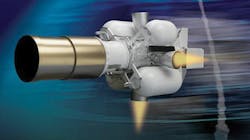Pentagon pulls plug on Boeing's multibillion-dollar Redesigned Kill Vehicle (RKV) ballistic interceptor
WASHINGTON – The U.S. Department of Defense (DOD) is scrapping its effort to redesign the lethal tip on the nation's ballistic missile interceptors, canceling a program that could have been worth more than $5 billion to the Boeing Co. and its partners. The Motley Fool reports. Continue reading original article
The Military & Aerospace Electronics take:
4 Sept. 2019 -- The Redesigned Kill Vehicle (RKV) was abandoned effective Aug. 22 due to technical design problems, according to a Pentagon statement. Michael Griffin, the Pentagon's undersecretary for research and engineering, called ending the program "the responsible thing to do." Griffin had halted work on the RKV in May pending a review, and apparently did not like the conclusions that came out of that review.
The decision, though not entirely unexpected, is a setback for Boeing and Raytheon Co., yet a new opportunity for those two companies and other large defense contractors to build a missile-defense weapon.
The RKV program is a Boeing-led effort, though the actual vehicle was to be built by Raytheon. Military leaders looked to the rocket-launched RKV to replace the existing, and at times unreliable, Exoatmospheric Kill Vehicle (EKV).
Related: Three defense companies to develop ballistic missile defense multi-warhead killer
John Keller, chief editor
Military & Aerospace Electronics
